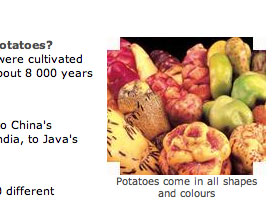I’ve added a little gizmo that makes it easier to keep up with comments happening here (the hidden agenda being to encourage people to share comments). When you go to leave a comment, you’ll see a link that lets you subscribe — and email will notify you of new comments. You don’t actually have to leave a comment to use it, so you can subscribe to a post that has a lively discussion without having to join the discussion.
How the European Common Catalogue destroys biodiversity
Charities know that it is a good idea to forge a bond between those who have and those who have not — the better to make those who have, give. So winsome children and kindly old people show us that we are all part of one big happy family, and families help one another, don’t they? But what if those who are normally the position of having, and giving, become those who need?
All of which is a roundabout way of saying that as far as agricultural biodiversity is concerned, Europe is probably more in need of help than anywhere else. Elsewhere, as in Europe, intensive agriculture and monocropping are destroying existing biodiversity. But elsewhere, unlike Europe, farmers, gardeners and ordinary folk who just want to grow themselves a bit of food have a bit of choice. If they can find the variety they want, they can buy it (or obtain it by barter, whatever) and grow it. In Europe that is not legal.
Continue reading “How the European Common Catalogue destroys biodiversity”
Too delicious
Q: When is potato diversity not potato diversity?
A: When it is in the hands of assorted experts.
 I hate to be pedantic here. (Actually, that’s a terrible lie; I love to be pedantic, especially about crops and food.) But if you look closely at the photograph, and you know your tubers, you’ll know that those aren’t potatoes in the picture. They are oca and mashua. Andean tubers, to be sure, but not potatoes. So who made this elemental error? None other than the good folks at the International Year of the Potato.
I hate to be pedantic here. (Actually, that’s a terrible lie; I love to be pedantic, especially about crops and food.) But if you look closely at the photograph, and you know your tubers, you’ll know that those aren’t potatoes in the picture. They are oca and mashua. Andean tubers, to be sure, but not potatoes. So who made this elemental error? None other than the good folks at the International Year of the Potato.
Worse, it’s on the page specifically addressed “Hey, kids!” (Lord how I love that exciting exclamation mark.) One could, of course, argue that the caption just happens to be underneath a photo of other Andean tubers. But that won’t wash. What we have here is a total and abject failure to know anything whatsoever about potatoes. How can kids! trust anything else on the page?
I’m sure that the International Year of the Potato will be a good thing, just as the International Year of Rice was a good thing. I’m equally sure someone will eventually detect this egregious and appalling error. In the meantime, just to be on the safe side, I snapped the page and am preserving it here for posterity.
And hey, potato people, my rates remain reasonable.
Bee shortage looms
Things don’t seem to be getting any easier for the fruit and vegetable farmers of the US, with a continuing shortage of bees. The number of commercial colonies in the US has halved over the past 25 years, according to the report. And that could show up in the price of almonds. I had no idea that the state of California supplies 80% of the world market for almonds.
Housekeeping help needed
A couple of people have reported problems with the comment system here. As it happens, both had Hotmail accounts, and messages from Hotmail were being bounced. I have no way of knowing whether this is a problem with the blog software or with Hotmail itself (and I am not about to sign up for Hotmail just to see). So, if you have a Hotmail account — or any insight into the problem — could you please try and share that information by leaving a comment to this post?
If that doesn’t work for you, please use to Contact Us link about to tell us what happened.
Thanks
The Management
p.s. Later … I wonder if it is anything to do with this hacker attack yesterday?